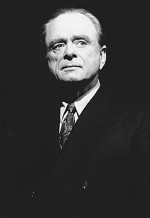Title
For its first production of the season, the Drama Division will present Arthur Miller’s classic All My Sons featuring fourth-year actors and industry veteran Harris Yulin, who will also direct. It opens on October 19.
Body
Begun toward the end of World War II and premiered in 1947, All My Sons stands at the threshold between Miller’s early plays and fictional writings and his canonical Death of a Salesman (1949). Like many midcentury artists, Miller, who died in 2005, struggled with the problem of representation in art amid a background of social calamity. Realism as a medium of artistic expression seemed naïve and inappropriate in a disenchanted society flirting with nuclear holocaust. With All My Sons, Miller would pioneer a compromising aesthetic that pinpointed time as its most crucial dramatic dimension. Inspired by Henrik Ibsen’s work, Miller sought to tackle what he once called “the biggest single dramatic problem, namely, how to dramatize what has gone before.” In All My Sons the action is not the result of willful decisions made by characters on stage; it is driven by the unseen force of past transgressions.
All My Sons begins with a portrait of peacetime tranquility, an “undisturbed normality” as Miller wrote in the preface to a 1961 edition of the play. Joe Keller (played by Yulin) runs a lucrative business manufacturing aircraft parts. Underneath the veneer of calm, however, lives the specter of a past atrocity. Under pressure to meet a contract during the war, Keller and his partner (and neighbor) Steve Deever had supplied the Air Force with faulty parts knowing full well the likelihood of their causing a fatal accident. In court, Keller blames Deever and pleaded his own innocence—and Deever ends up going to jail. To complicate matters, Deever’s daughter, Ann (Phillipa Soo), had been engaged to Keller’s son Larry, who disappeared several years before the play takes place.
“The tragedy of the play takes place inside of this tremendously loving environment that he presents us with between two families,” Yulin said in an interview with The Journal. It was precisely so that his sons could be guaranteed a prosperous future in his manufacturing business that Joe Keller committed his crime. The tragic outcome of Keller’s decision is seen in the estrangement of his son, Chris (Michael Curran-Dorsano), the bitterness of his wife Kate (Claire Karpen), and what we eventually learn was the suicide of Larry. Joe Keller justified his actions as a sacrifice that would ensure the survival of the Keller legacy, but they ended up tearing the family apart.
“The concept behind it was that Joe Keller was both responsible for and a part of a great web of meaning, of being,” Miller said in a 1999 interview with British Miller scholar Christopher Bigsby. “He had torn that web; he had ripped apart the structure that supports life and society. … A person who violates it in the way he did has done more than kill a few men. He has killed the possibility of a society having any future, any life. He has destroyed the life-force in that society.”
The larger-than-life emotional content of Miller’s tragic drama poses a number of expressive challenges for its young actors, which, for James Houghton, Richard Rodgers Director of the Drama Division, is precisely the point. “Not only does Miller challenge our collective American conscience and morality, he insists on an emotional integrity in the work of the actors as they bring the story to life,” he said in an interview with The Journal. “This seems like just the right mountain to climb for our fourth-year actors—and there is no one better to guide this project than Harris Yulin.”
A prolific actor and director, Yulin, who last season directed and appeared in a production of Proof at Juilliard, has proven throughout his long career to be equally at home in film, television, and the stage. This is his first time directing All My Sons, and he said he sees his conception of the play as less about being than becoming. “I don’t know what it is yet, we’ll really have to see,” he said. “I never know very much about a play until I’ve done it and lived inside it, but it seems to me like moving into an extremely well-built house.”
That house’s architect, whom Houghton eloquently recalls from his own experiences with Miller, was no novice. “Arthur was always digging for the truth in his work and his life,” he said. “All My Sons was no exception. In fact, it represents Arthur’s journey so completely: How do we live with ourselves? All of ourselves?”





